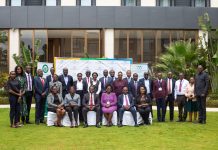By Milliam Murigi
The East African Science and Technology Commission (EASTECO) has developed the first Regional Biotechnology Strategy, aimed at harmonising biotechnology regulations and policies across the East African Community (EAC) partner states.
Speaking during the strategy validation meeting, Dr. Sylvance Okoth, EASTECO Executive Secretary, said that the strategy is designed to guide the region’s biotechnology development over the next decade (2026–2036), promising a coordinated framework to advance scientific research, ensure safety, and foster innovation.
“Biotechnology, along with sound biosafety and biosecurity measures, holds immense potential to transform key sectors of our economies such as agriculture, health, industry, and the environment. But to realize these benefits, we must act in concert, guided by a shared strategic vision,” says Okoth.
The objectives of the strategy include developing and implementing policy, legal, and institutional frameworks; supporting research, innovation, and commercialisation; strengthening systems for safe and secure biotechnology use; enhancing organisational, infrastructural, and human capacity; increasing public awareness, engagement, and communication; mobilising resources and building partnerships for sustainability.
However, according to him, strategy alone is not enough. Policymakers, regulators, scientists, private sector actors, and development partners must ensure that implementation happens, thus giving life to the document.
Nardos Bekele-Thomas, Chief Executive Officer for the Africa Union Development Agency- New Partnerships for Africa’s Development (AUDA-NEPAD) said that this strategy is timely and well aligned with continental priorities, including Agenda 2063, the Science, Technology and Innovation Strategy for Africa (STISA), Comprehensive Africa Agriculture Development Programme and broader global commitments.
According to Bekele-Thomas, biotechnology is not only a tool of scientific advancement, but also a cornerstone of Africa’s aspirations for sustainable development—contributing meaningfully to food security, equitable healthcare, climate adaptation, environmental sustainability, and industrial growth.
However, she revealed that while biotechnology offers vast potential, it demands equally robust systems of stewardship. Its effective and ethical deployment will depend on a collective commitment that is technical, political, and financial from all stakeholders.
“The African Union Development Agency-NEPAD stands ready to walk this journey alongside you, supporting not only the strategy’s validation but its full and effective implementation,” she said.
According to Dr. Willy Tonui, Chairman and Executive Director Environmental Health Safety, the development of this strategy marks a significant milestone for the biotechnology sector in the region. He noted that widespread misconceptions, particularly the belief that biotechnology is limited to Genetically Modified Organisms (GMOs), have hindered product adoption and led to skewed reporting on the subject.
A key pillar of the strategy will be the creation of the EAC Biotechnology Harmonisation Programme, which will align national policies, eliminate regulatory fragmentation, and promote cross-border collaboration.
“The harmonisation programme will play a pivotal role in raising regional standards, fostering innovation, and scaling up public awareness. By unifying approaches, the EAC aims to enhance biosafety, biosecurity, and public confidence in biotechnology solutions,” said Tonui.





